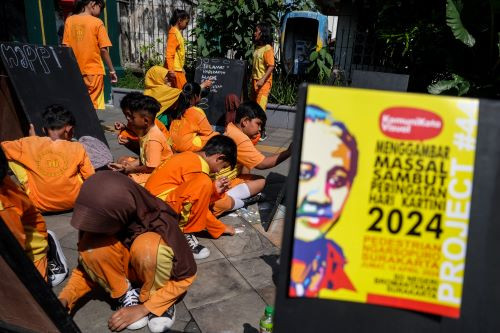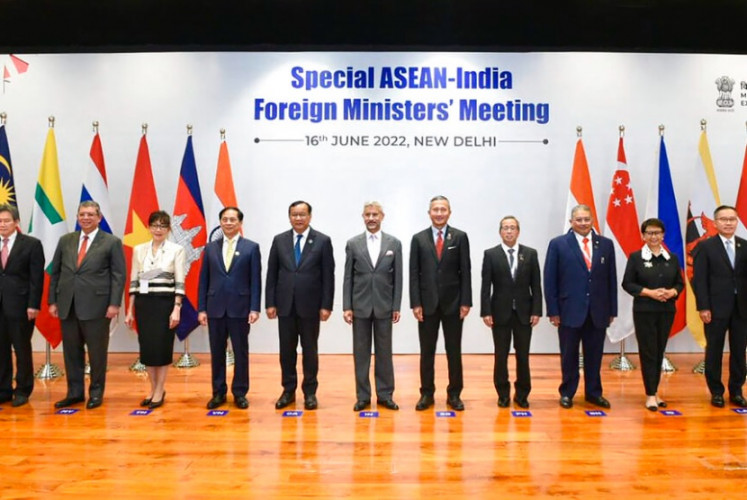Decoding Najib's megaphone diplomacy
Najib raised more eyebrows when he called on Indonesia’s President Joko “Jokowi” Widodo to join him. “Do not just protest against Ahok. The Rohingya should be defended in Indonesia,” he told Indonesian Muslims.
Change Size
 Rohingya children gather at the Dar Paing camp for Muslim refugees, north of Sittwe, western Rakhine state, Myanmar, June 24 2014. (AP/Gemunu Amarasinghe)
Rohingya children gather at the Dar Paing camp for Muslim refugees, north of Sittwe, western Rakhine state, Myanmar, June 24 2014. (AP/Gemunu Amarasinghe)
E
arlier this month, Malaysia’s Prime Minister Najib Razak made what many saw as a serious breach of diplomatic protocol when he spoke out against Myanmar’s treatment of the Rohingya — treatment that, in his view, amounted to “genocide”.
Such an act of megaphone diplomacy is almost unheard of among the ASEAN member states, especially coming from an ASEAN leader, and poses serious ramifications for the ASEAN region.
Speaking at a mass rally that was organized to show solidarity with the Rohingya, Najib directly questioned the inaction of Myanmar’s State Counselor Aung San Suu Kyi, pointedly asking, “What’s the point of a Nobel Peace Prize?” and telling her, “Enough is enough!”
Najib raised more eyebrows when he called on Indonesia’s President Joko “Jokowi” Widodo to join him, even making reference to recent Muslim protests in the Indonesian capital against the incumbent Governor Basuki “Ahok” Tjahaja Purnama. “Do not just protest against Ahok. The Rohingya should be defended in Indonesia,” he told Indonesian Muslims.
(Read also: Good reason to tread carefully on Rohingya crisis)
Jakarta has yet to respond to Najib’s move, but Naypyidaw has predictably condemned Malaysia’s interference in its domestic affairs. A day before the rally, an official in Myanmar’s President’s Office warned, “A member country [of ASEAN] does not interfere in other member countries’ internal affairs”, while a commentary by The Irrawaddy’s editor-in-chief was headlined, “Malaysia, Don’t Use Burma to Distract from Disquiet at Home”. The Myanmar government has since announced it was stopping its migrant workers from going to Malaysia and Suu Kyi has refused to meet Malaysia’s foreign minister.
How, then, do we explain Najib’s move? What are the ramifications for the ASEAN region? What steps should Indonesia — as the region’s primus inter pares — take to not only restore ASEAN unity but also to help resolve the Rohingya issue?
Many have attributed Najib’s strong stance as a political move aimed at distracting the domestic public from the 1MDB scandal, as well as an attempt to burnish his credentials among the Malay Muslim voters ahead of upcoming general elections in 2018. Certainly, the recent Bersih 5 rally indicates that the 1MDB scandal continues to haunt Najib, who is also facing a sustained challenge by former prime minister Mahathir Mohamad to force him out of office. Indeed, the latter has formed his own political party, Parti Pribumi Bersatu Malaysia, which will compete for the same Malay Muslim voters who have traditionally supported Najib’s UMNO (United Malays National Organization) Party.
Yet, it is important to consider the following facts. First, the rally attended by Najib also saw political leaders from the opposition PAS (Parti Islam Se-Malaysia) take part, meaning it had some degree of cross-party support. Second, the Rohingya issue was also previously discussed by the Malaysian cabinet. On Nov. 25, the cabinet met to consider a proposal for its national soccer team to withdraw from a regional competition co-hosted by Myanmar.
While the Cabinet decided against the proposal — fearing FIFA sanctions — Malaysia’s Youth and Sports Minister Khairy Jamaluddin explained, “We will pursue other avenues in raising our concerns [...] We will use diplomatic (means) that will be announced by the Foreign Ministry.” Here it should be noted that while the UMNO party dominates the cabinet, a number of positions are held by non-Muslim parties that would have no need to attract the Malay Muslim votes.
Third, on the day prior to the rally, the Malaysian Foreign Ministry issued its own strong statement saying, “The fact that only one particular ethnicity is being driven out is by definition ethnic cleansing.” Interestingly, when the statement was shared on the ministry’s official Twitter page, the hashtag #R2P (responsibility to protect) was also used.
While the interests of politicians and bureaucrats are often blurred in a country where UMNO has held power since 1957, one would imagine that foreign ministry officials would not so easily allow political considerations to harm the country’s foreign policy.
As such, it is clear that there is some sense of consensus among Malaysia’s political leaders and bureaucrats on the Rohingya issue that goes beyond an attempt to distract from a particular scandal and/or vote-winning ahead of upcoming elections.
Given the above, it is possible that more consideration has gone into Najib’s megaphone diplomacy than was initially thought.
While that may be the case, it is also clear that Malaysia’s stance has serious ramifications for ASEAN. For one thing, Najib’s appeal to Indonesian Muslims threatens to export his brand of religious politics to the ASEAN level and divide the region along Muslim versus Buddhist lines. This is not only foolish but dangerous in such a diverse part of the world.
His stance also represents a major departure from the ASEAN norm of not openly speaking about each other’s domestic affairs. By doing so, Malaysia threatens to open a Pandora’s Box, which may lead to Myanmar responding with its own difficult questions about Malaysia’s domestic problems. Such a situation, whereby member states start criticizing each other’s domestic problems out in the open, will do no good for ASEAN unity.
As mentioned before, we have already seen one ASEAN minister refusing to meet another and an ASEAN member state imposing a ban on its citizens from working in another member state. This is far from what should be happening during the first year of the ASEAN Community’s regional integration and requires urgent regional leadership to not only restore ASEAN unity but also to help resolve the Rohingya issue.
In this sense, Indonesia’s more nuanced approach should be welcome. While Indonesia has gone for more quiet methods, that does not necessarily mean it is brushing the Rohingya issue under the carpet. Jakarta recognizes that the focus should be on taking steps that will actually help the Rohingya. This can be achieved neither via megaphone diplomacy nor by offending Naypyidaw.
Indeed, there are deep-rooted, complex and multiple underlying factors that have led to the situation in Rakhine state. Only with the cooperation of the Myanmar government will an effective, long-lasting and comprehensive solution be found that appeases all stakeholders, including the Rakhine Buddhists, the Rohingya Muslims and the mostly Burman military.
Indonesia should thus continue to position itself as an honest broker that understands the complexity of the situation and that realizes this is more than just a religious issue. Its offer to dispatch humanitarian aid is a good first step.
The offer builds on Indonesia’s previous efforts that have led to the building of schools and a hospital in Rakhine state and demonstrates two points: on the one hand that Jakarta is rightly focusing on the practical needs of food, blankets, education, health care, etc., and on the other hand that Jakarta has earned the trust of Naypyidaw to even conduct such activities inside the volatile Rakhine state. In this sense, President Jokowi would do well to politely ignore Najib’s call to join him. There are better ways to address the situation in Myanmar.
***
The writer heads the ASEAN Studies Program at the Habibie Center in Jakarta. The views expressed are his own.
---------------
We are looking for information, opinions, and in-depth analysis from experts or scholars in a variety of fields. We choose articles based on facts or opinions about general news, as well as quality analysis and commentary about Indonesia or international events. Send your piece to community@jakpost.com. For more information click here.







